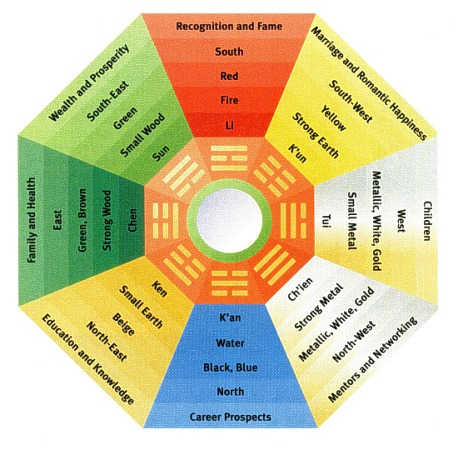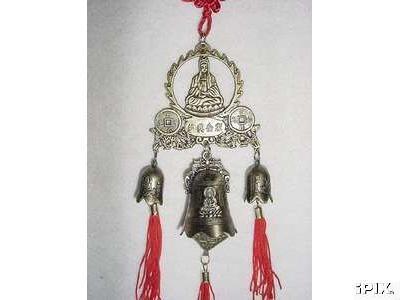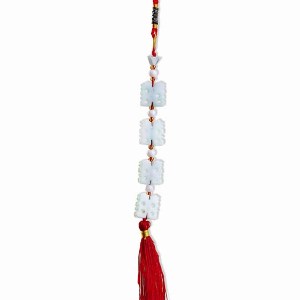Calm Spirit
Feng Shui for Home and Office
The ancient Daoists (Taoists) developed feng shui from their understanding of the subtle energies that make up the universe. Feng shui's timeless appeal lies in the unique combination of ancient Chinese wisdom and practical common sense. You can learn about how to use feng shui to protect your personal energy from books, practitioners, and sources on the internet. This will be an introduction and explanation of some of the basics.
According to the Dao, all energy is connected. This connection is symbolized by the familiar yin yang symbol. Traditionally, yin is the dark feminine and receptive principle, and yang is the light, masculine and active principle. Yin and yang are in a constant state of flow, and flow endlessly into each other. Nothing is completely yin, or completely yang.
Qi, or this yin yang energy, can be represented in lines. Yang is represented by a solid line, and yin is represented by a broken line. A trigram is made up of three stacked lines, either yin, or yang or a combination of both. All of the qi in the universe can be represented in eight trigrams. The eight trigrams are called the bagua. The I Ching, ancient Chinese Book of Changes, is based on the readings of trigrams.
Feng shui practitioners use a bagua map or template to place over rooms, buildings, sites or landscapes. Each "gua" corresponds to one of the eight areas of life experience: career and journey, knowledge and self awareness, helpful people and travel, family and health, children and creativity, prosperity and wealth, fame and reputation, and relationship and marriage.

The five elements, fire, earth, metal, water and wood, are always moving and changing, and can exist in a yin or yang state, and includes color, building shape, landscape form, home environment, room, Chinese/Taoist astrological sign, planet, direction, climate, season, emotion, symbol and body organ.
The ancient Daoists were masters of intuition. They sensed the balance of qi in the environment. They sensed the meridians of qi in our bodies, developing the system of acupuncture. Through meditations on plants, they sensed the qi of the plants to understand the medicinal properties of herbs, and developed the traditional Chinese medicine system. Even in our modern times, we can't always explain why some places make us feel relaxed, calm and comfortable, and other places "give us the creeps". Thus feng shui helps to explain this, but much is still based on intuition and feeling.
To keep it simple, clean your home as you usually do, then enter it from the usual entry point as if you were a stranger coming into your home for the first time. What do you see? What do you smell? What do you hear? And most important, what do you feel? Walk into each of your rooms, and do the same thing. If a room, or an area, feels "wrong" or uncomfortable, the qi is probably not flowing smoothly and could use some changes or rearrangements.
There are some very good books about feng shui, how to use it, make corrects, and my favorites are listed at the end of this article. Some elements in rooms can be changed, but many times it is architectural in nature, or impracticable to make the complete change. There are hangings with the colors, symbols, figures that you can use to improve the feng shui of areas that need help.



You can use feng shui to bring wealth and good luck. Jade money toads pointed toward the wealth area of your home or office are very traditional. The wealth "piggy bank" as shown above is available for purchase.
Check out the feng shui section of Ying Yu Jade for more items to bring good health, happiness, luck and fortune to your home, office and life.
Recommended reading:
Taoist Feng Shui, the Ancient Roots of the Chinese Art of Placement, Susan Levitt
Lillian Too's Easy to Use Feng Shui, by Lillian Too
Ying
Yu Jade
Calm Spirit Links:
Home
/ Online Counseling / Ask
Calm Spirit
Chinese Wellness: Fibromyalgia,
Migraines and More
Energy Healing: Qigong, Reikie and More
Gua Sha
Chinese Herbs and Tea
China Travel
Entire
contents of this website is copyright © 2000 Calm Spirit
All rights are
reserved. Copying of images or text is not permitted
without written consent
from Calm Spirit
Please be respectful and understand that if you copy our
work without
permission you are infringing on our ability to make a living.